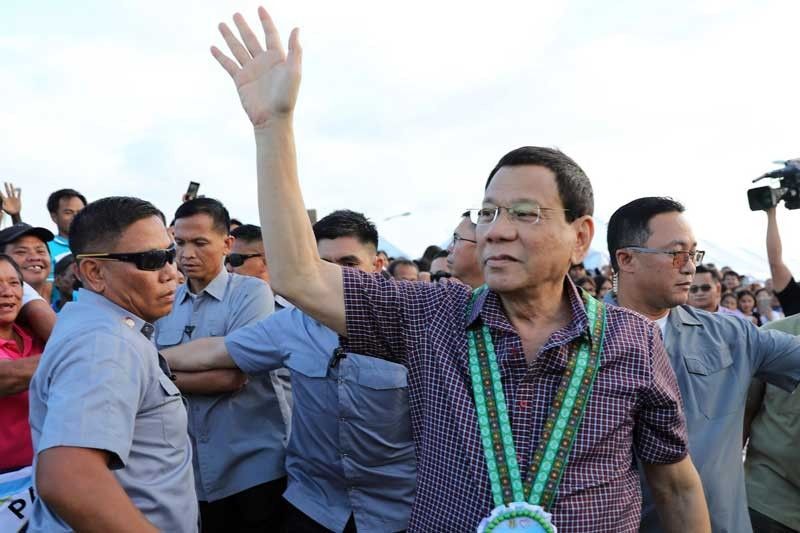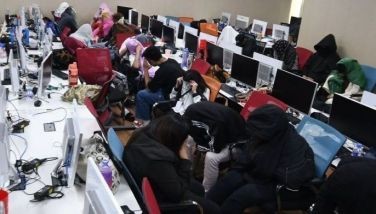Duterte withdrawing Philippines from ICC

Claiming he was being unfairly accused of massive violation of human rights in waging his war on illegal drugs, the President announced yesterday that the country is withdrawing its ratification of the Rome Statute, which created the International Criminal Court (ICC). File
MANILA, Philippines — The Philippines is breaking free from a global treaty that empowers an international court to investigate and hold tyrants and oppressive leaders accountable for their misdeeds – if President Duterte will have his way.
Claiming he was being unfairly accused of massive violation of human rights in waging his war on illegal drugs, the President announced yesterday that the country is withdrawing its ratification of the Rome Statute, which created the International Criminal Court (ICC).
Duterte’s decision came weeks after ICC prosecutor Fatou Bensouda began a “preliminary examination” of the country’s human rights situation in the context of his bloody war on drugs.
It also came on the heels of UN High Commissioner on Human Rights Zeid Ra’ad al-Hussein’s remarks that Duterte should undergo psychiatric evaluation. The President has also been badmouthing UN special rapporteur on extrajudicial killings Agnes Callamard for “prejudging” him.
The Philippines signed the Rome Statute on Dec. 28, 2000 and ratified it on Aug. 30, 2011.
“The Philippines in ratifying the Rome Statute was made to believe that the principle of complementary shall be observed,” Duterte said.
“Given the baseless, unprecedented and outrageous attacks on my person as well as against my administration, engineered by the officials of the United Nations, as well as the attempt by the ICC special prosecutor to place my person within the jurisdiction of the ICC, in violation of due process and the presumption of innocence expressly guaranteed by the Philippine Constitution and recognized no less by the Rome Statue, I therefore declare and forthwith give notice, as President of the Philippines, that the Philippines is withdrawing its ratification of the Rome Statute, effective immediately,” Duterte said in a statement.
Duterte said he was deprived of due process and the constitutional presumption of innocence when Bensouda created an impression that he is to be charged with serious crimes.
“At the onset of my presidency, there appears to be a systematic assault by the United Nations as well as its special rapporteurs not only on my person, but on my administration as well, more particularly on the relentless campaign against the proliferation of illegal drugs industry in the country,” Duterte said.
He argued that before the ICC can assume jurisdiction over a nation, it must first firmly establish that such state is “unwilling or unable to investigate or prosecute for the crime of genocide; crimes against humanity; war crimes and crimes of aggression.”
He also accused UN rapporteurs of portraying him as a “ruthless and heartless violator of human rights” responsible for the deaths of thousands.
“The actuations and statement” of Zeid and Callamard “readily show international bias and refusal of some sectors of the international community to support the Philippines’ legitimate efforts at self-determination, nation-building and independence from foreign influence and control,” he said.
Political tool
The ICC, he added, has become a “political tool” against the Philippines as shown by its “propensity for failing to give due respect to the state parties of the Rome Statute and that there is a clear bias on the part of the UN against the Philippines, the Philippines may very well consider withdrawing from the Rome Statute.”
He also stressed that the non-publication of the ratified treaty in the Official Gazette has made it non-binding.
Presidential legal adviser Salvador Panelo, who provided the copy of the President’s statement to the media, said yesterday that the ICC is deemed notified of the Philippines’ withdrawal.
Now that the Philippines is no longer party to the treaty, Panelo said it makes no sense for the President to participate in any investigation.
According to Panelo, the President has signed the 15-page statement, which may be sent to the ICC through the Executive Secretary or the Department of Foreign Affairs.
Panelo rebuffed criticisms that the President was actually afraid of being brought to the ICC, hence his legal team’s resorting to technicalities to avoid the international tribunal.
Presidential spokesman Harry Roque confirmed that the President also directed Executive Secretary Salvador Medialdea to give notice that “we are withdrawing as state party to the Rome Statute of the ICC.”
In his statement, Duterte emphasized the wrongdoing he was being accused of was not genocide or crime against humanity.
“The acts allegedly committed by me are neither genocide nor war crimes. Neither is it a crime of aggression or a crime against humanity,” Duterte said.
He maintained that the deaths occurred in the “process of legitimate police operation” and the operatives “lacked the intent to kill.”
Duterte cited “self-defense” to justify the deaths.
“The self-defense employed by the police officers when their lives became endangered by the violent resistance of the suspects is a justifying circumstance under our criminal law, hence they do not incur criminal liability,” the President said.
“The deaths resulting in the process of making lawful arrests arising from the violent resistance of the suspects that endangered the lives of the police officers cannot be said to have been committed against a national, ethical, racial or religious group,” Duterte added.
Since the operations are a result of lawful exercise of duty, it cannot be considered as crimes against humanity, he stressed.
Ignorance of the law
In the statement, Duterte described as a “brazen ignorance of the law” the attempt to place him under the jurisdiction of the ICC.
A lawyer and prosecutor before he became a politician, Duterte also pointed out how Callamard had embarked on a campaign against him before the global community.
He said the UN rapporteur’s report was devoid of proof because she relied merely on news reports and accusations hurled by critics.
Duterte also expressed disgust at how Callamard had pictured him as a ruthless violator of human rights and directly responsible for the deaths of suspected drug offenders.
In his 15-page statement, Duterte noted how Zeid had joined the UN rapporteurs “in maligning my person by saying that I should submit myself to psychiatric examination.”
The President also took offense at the statements of two Filipino special rapporteurs, Victoria Tauli-Corpus and Cecilia Jimenes-Damary, for accusing the government of harassing and violating the rights of indigenous communities.
With the Rome Statute not published in the Official Gazette, the Palace said it is deemed understood that the “rescission of such agreement or the withdrawal of our country’s ratification of the Rome Statute is in order.”
He also quoted the provision on withdrawal under Article 127 of the Rome Statute, which states: “A state may, by written notification addressed to the Secretary General of the United Nations, withdraw from this Statute.”
Duterte said the provision – which also provides that the withdrawal shall take effect after the date of the receipt of the notification, unless the notification specifies a later date – is not applicable to the Philippines “for the reason that there appears to be fraud in entering such agreement.”
- Latest
- Trending
































